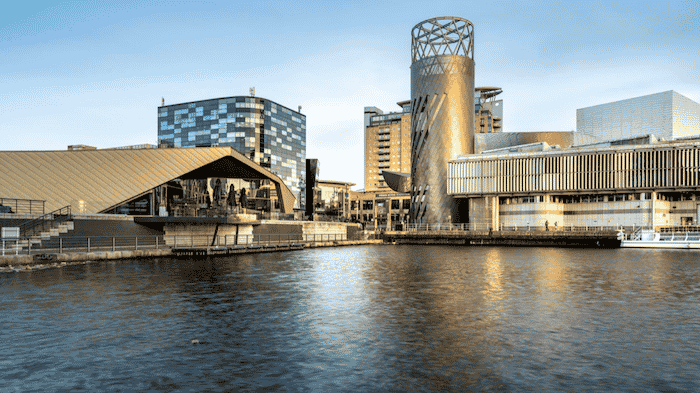The story of an abandoned Mill that became a world renowned arts hub
- Written by Thom Bamford
- Last updated 1 year ago
- Art & Design, City of Salford, Community, Culture, Exhibitions, Featured
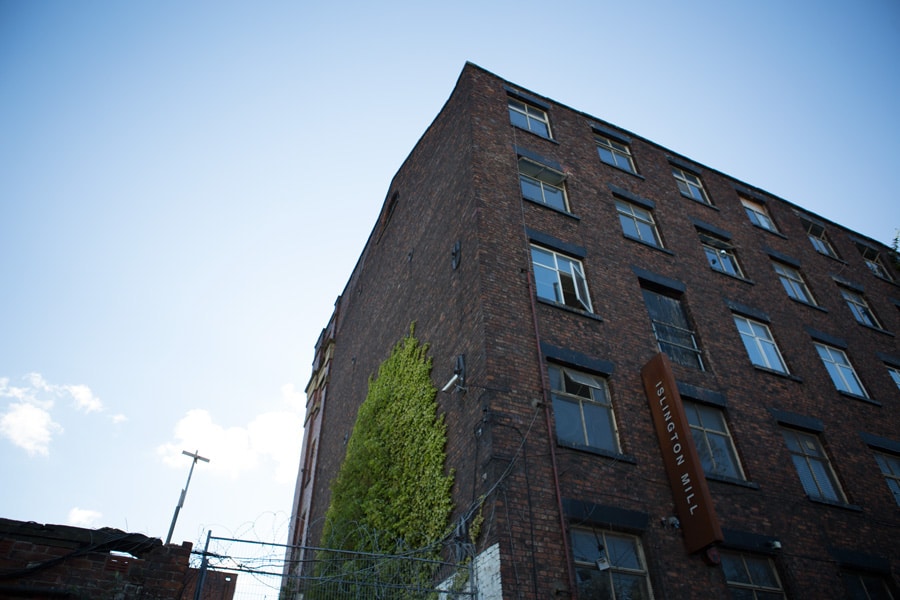
Islington Mill has had a fascinating journey.
What was once a partially abandoned mill has been transformed into a thriving arts hub, providing a nurturing environment for Manchester’s artistic community to flourish.
With a rich history and dedication to artistic empowerment, Islington Mill has become a shining staple community project that is driving innovation and artistic collaboration in the city.
Islington Mill has become one of Salford‘s leading cultural institutions, hosting over 5000 artists from 35 countries and attracting more than 15,000 visitors annually.
However, the road to where they are has not been a smooth one.
The Story of the Islington Mill
The story of the Islington Mill began in 1998 when Bill Campbell arrived at the mill, renting a studio space in the building that captured his imagination.
We sat down to talk with Bill, who talked us through the mill’s earnest beginnings.
They said: “I first invited established artists and new graduates to make exhibitions and we did week-long festivals using all kinds of venues up and down the street to install 100 artist work in unusual or site-specific places.
“We would do an opening with a bit of cheap red wine and then all go down the pub.
“It was when I met Morry who 18 years later would become my husband and his brother Mark that the worlds of art and music collided.
“Morry and Mark inspired by the spaces we had used for exhibitions along Chapel Street reimagined this idea as a music festival.
“And now they host an annual Sounds from The Other City every year.”
Buying the Islington Mill
After several years of trying every available avenue to borrow or raise money, In 2000 they reached a significant milestone.
By using high-interest and risky bridging finance, Bill was able to purchase the entire listed building, initiating a gradual renovation process, which would end up taking a long time to complete.
A long time, in that it has only just been completed this year.
Bill said: “The biggest challenge was that the building needed a major overhaul, the roof leaked, windows were single-glazed and rotting, and there wasn’t a lift.
“The entire top floor had never been able to be used as it was full of buckets that we would have to run around and empty whenever there was a major storm.
“We didn’t make any money on the events, because we paid artists and staff to run the events, our drinks were cheap, our hours were long, and often promoters would know that to do an event at the mill, maybe about 25% of the crowd who might go out if it was in the centre, would just not make it out to Salford, so some amazing nights only got a portion of the crowd they deserved.
“But those that did come always had a special time.
“Money made was put back into doing more events and keeping rents cheap for artists.
“The building needed a massive cash injection of £ 100k Several hundreds of thousands to make a difference.
“Once you get into the realms of planning permissions and scaffolding and large contracts there becomes a point where you either have to do it all with lots of cash or not bother.
“Raising the money was the biggest challenge. I had also been looking to find a partner or someone with money and skills, but they always want to do things in their money-making model, which usually involves making flats.
“Meanwhile the public funding sector demands that you prove your worth against every other priority in the city.
“It is really hard to say how much you need help, whilst also demonstrating that you are viable and reliable.
“We are creative artists and community-led and want to stay cheap and available, but we also have to show sustainability and professionalism. It’s a bit of a mind twist.
Over the years, the mill has been transformed into a dynamic space that now houses over 100 resident artists and collectives.
The Early Days of the Mill
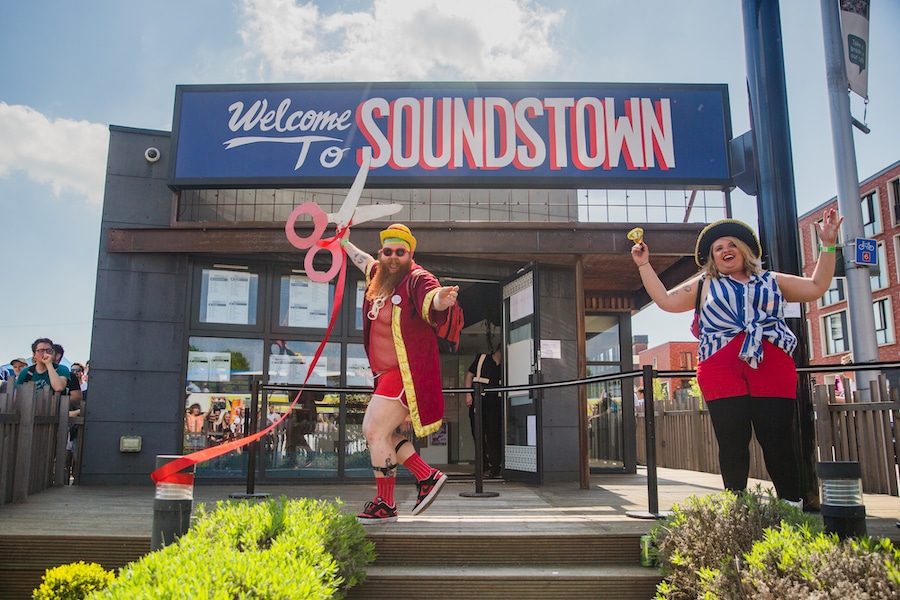
Speaking about the early days of the Mill, Bill said: “The first few events were just personal parties like my birthday or New Year’s Eve for friends, but because I lived at the time with Jayne Compton who is an amazing DJ with a great record collection those parties rocked with the sounds of the early to mid-2000’s CCS, Gossip or The Organ being our favourites.
“Morry and his brother Mark had decided to set up a small music festival in 4 pubs including The Kings Arms, and Salford Arms down the road, but around the same time a new band who had recently signed a record deal would later become the Ting Tings were looking for space and they asked if they could rent my house as a rehearsal/recording/living space.
“So knowing I was about to have to do a refresh of paint it made sense that we could do an after party for Morry’s Sounds From The Other City music festival, as a thank you for the bands who had played but hadn’t been paid much money, in the house and if we trashed the place it wouldn’t matter as we would repaint the whole thing.
“We hadn’t anticipated that just about everyone would want to come along.”
This marked the humble beginnings of Islington Mill Arts Club, which would eventually evolve into the multifaceted creative space it is today.
We asked about the project and the early hedonistic days of the Mill.
He said: “As we began to realise that people were happy to come out to Salford for an intriguing party or small festival, and having spent some time in Berlin where Morry and Marks other brother Paul ran a very Berlin style raw club.
“We knew that you didn’t need loads of money to make a venue space all shiny with glass and steel, designer furniture and lighting.
“That as long as it was safe, with a half-decent sound system then people liked the freedom a raw space offered and that you could just use a projector and some lamps to make a space feel ready for a club. The darker and dirtier the better!
“Berlin permitted us to just do it and I think we inspired other places in the city like Soup Kitchen or The White Hotel to just go with the spaces as is and to focus on the artists and the content of the events more than interior decor.
“We liked to party all night and would often be the place people came to after everything else had closed, so our licence kinda had to be 24 hours.
“We started to put on bands, Lots of Manchester bands but also a lot of bands from Europe, America or Japan, mostly alt-psych rock folk or electronic bands. Acid Mothers Temple, Ghost, Ariel Pink, Gnod, Denim and Leather, Boris, Melt Banana.
“Also Queer cult bands and performers, Like Christeene, Mykki Blanco, Ssion, MEN or Peaches
“Later we also had more established bands like Elbow, Grimes, Lady Miss Keir do one-off specials and Bjork did an after party for MIF one year.”
“Many of these artists would stay with us in the house which we also ran as an artist in residence space and an Airbnb – Some friends Joe and Lou used it as ’their’ BnB because they wanted to go on 4 in a bed.
“It is right next to the club, so for us and artists staying and playing, you could stagger right off the dance floor and be in bed in about 10 wobbly steps.
“Which was great but also made leaving the party quite difficult. No need to wait for a cab or to round up friends, it was easy to stay for just one more.
“It was very convenient for the artists, to have their digs, green room and hosts all in one place and it was a real privilege to get to know people both late at night and breakfast the next afternoon.
“Christeene became a regular coming over from Austin Texas every year or so. The NYC dance party collective Cheryl (Cheryl will ruin your life) also came year after year.”
It remains a truly unique place for artistic expression and one of a kind venue.
The growth of Manchester and its impact on the arts
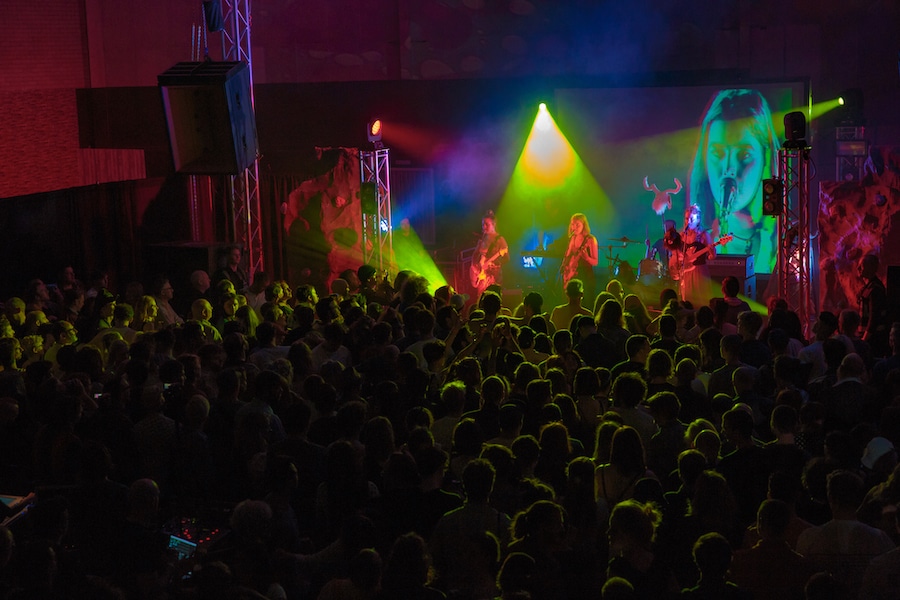
I asked Bill about whether these places were becoming less and less common as the city develops, and whether opportunities for fledgling artists are being limited by the growth and revitalisation of the city.
He said: “It has already happened. It may already be too late. Object Studios, Masa, Sigma, Artwork Atelier, Mirabel, and Rogue Studios to name a few have all been displaced, disbanded or moved out of the city centre.
“Creative people I know are choosing greener, cheaper places like Todmorden, Littleborough, and Glossop for a better quality of life.
“Each time one of these spaces has established itself people are putting their all into developing and holding those projects and communities together.
“Learning how to manage buildings and communities safely; constantly raising money, working out how to communicate nuanced ideas to funding deadlines, dealing with noise complaints, legal and financial obligations of building and licenses, fixing moving or tidying things, responding to tenants questions, sharing opportunities, showing people around, inviting new people in, getting events happening and generally supporting each other through business and personal crisis.
“You have to learn to be a ‘jack of all trades’ and not be allowed to become a master of any.”
Islington Mill faced challenges in the past, including a noise complaint that threatened its license, but it received overwhelming support from the community and was allowed to continue operating with certain conditions.
Bill continued: “Every time they are displaced those people get tired and dejected and everything they have learned is then lost when they give up and go and do something else.
“This erosion of the knowledge and supply chain is the biggest stumbling block to Manchester and Salford’s future creative success and I think they are making big big mistakes to not see that.
“Investing in people not just buildings.
“To give people who want to build community and creativity safe spaces which are not under threat of closure, displacement or bureaucracy and allow them to get on with what they are good at without contorting themselves to fit would pay massive dividends because for each of those people, they will inspire and grow 10’s or 100’s more who will become, great bands, artists and a rich infrastructure going forward for the city and the region.
“Salford City Council has been extremely supportive and match funded other money from Arts Council and Heritage Lottery, however simultaneously they are developing the last remaining industrial spaces around the mill into residential spaces, We managed to save 2 warehouses full of artists but we are about to lose 3 warehouses this autumn which I think is a big mistake that Salford will regret in years to come.
“There is a housing shortage, however, what are all the people moving in going to do to connect and be inspired to try new things and to form a meaningful community?
“People need a sense of possibility.”
“The confidence they can give something a go. try it out on a small scale first without risking everything they have but regeneration increases land value meaning only those with deep pockets can set up a bar, club, restaurant or shop. Spaces, where people can connect and share ideas, ask for help or try out an idea, are crucial. Surely the pandemic taught us that we need and want to be out and about around people.
“Places and people don’t just land overnight fully formed and competent, like a Starbucks, the same in every city across the world. Places like Islington Mill need time to grow, settle and try out ideas and then try again when they don’t quite work out.
“Whether it’s the Ting Tings years ago, or more recently Cheddar Gorgeous breaking out and gaining international recognition, they both spent years looking, observing, testing out what they do and forming their creativity and identity.
“They also rely on so many others to be around them who are willing and able to support them.
“They need the first gig in a pub or club, to feel what an audience responds to and to feel that feedback. They need to see and hear how other people have done it, the challenges they have faced and the hints at possible solutions.
“They need promoters, agents, managers, event producers and mentors – people who will say, ‘go on, give it a go, and if you fail or fall I will help pick you back up’.
“They need the wig makers, the costume designers and makers, the podcast hosts and the music producers, the DJs, the visuals and animators, the event producers, the video makers, website designers, the t-shirt, flyer, and poster printers.
“They need the people who have faced the challenges before.
“Who knows what to do when someone doesn’t pay you or asks you to do something for free or in return for a promo? They need places to hang out and meet each other to find all that stuff out.
“It is a romantic idea that artists and creatives just sit around coming up with amazing ideas out of somewhere, the reality is they practice and experiment.
“They are constantly absorbing and learning on the job for years and years to be that good, and then they have to learn how to apply it all in new places and at new levels of success all the time.
The refurbishment and growth of Islington Mill
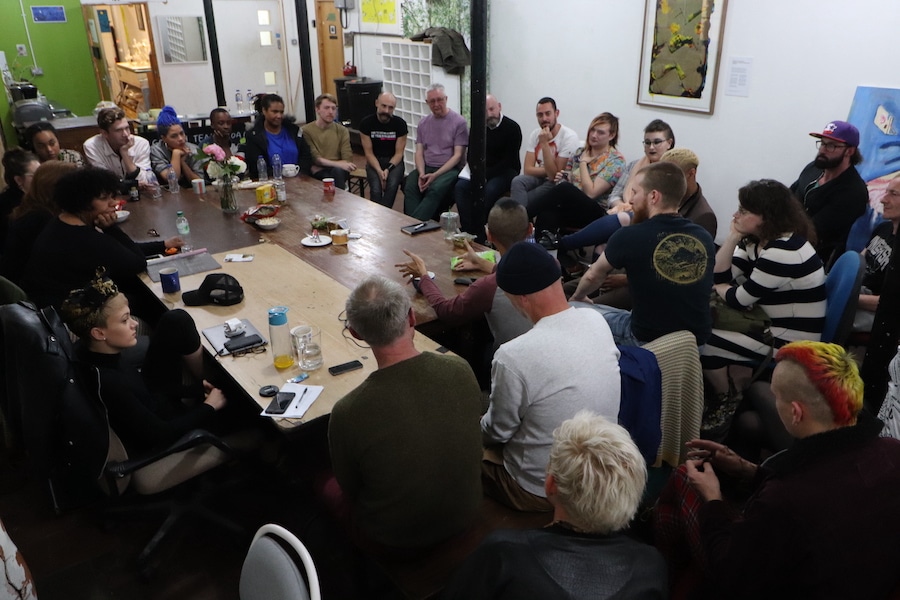
The extensive refurbishment resulted in artist studios across four floors, providing a haven for creativity to flourish.
The mill offers affordable studio spaces for more than 50 creative residents from various artistic disciplines, such as graphic designers, musicians, and framers.
It is not just a venue for public events like gigs, exhibitions, and workshops but also includes a B&B and Engine House that accommodates musicians, resident artists, and tourists.
Additionally, a large open space on the fifth floor and an atmospheric attic space on the sixth have become venues for events, performances, and communal activities.
What sets Islington Mill apart is its unwavering commitment to fostering connections, collaboration, and co-creation among artists.
The mill has become a melting pot of diverse artistic disciplines, facilitating cross-disciplinary interactions that inspire innovation and experimentation.
It has become a focal point for the arts community in the North-West, attracting both local talents and visiting international artists seeking to be part of this vibrant creative network.
Central to Islington Mill’s ethos is the belief in the power of organisation, responsibility, participation, and freedom.
Embracing a DIY (Do-It-Yourself) ethos, the mill provides opportunities for emerging artists to explore their potential, build platforms for their work, and challenge the boundaries of traditional artistic practices.
Bill continued: “I am not a writer but I would like to share my story.
“The MIF Modelling Queer Utopias is a first attempt at doing that.
“I began thinking that the builders would finish their work on time in March 2022, then July 2022 – which would have given me a year to experiment and establish our new spaces.”
But the deadline moved to August, October, December and March 2023.
Eventually, they left 7 days before MIF opened.
“By which point MIF needed to know what to put on the website and what tickets to sell.
“We settled on simple tours as we knew that people always enjoyed just seeing the building but I was sure I wanted to tell the ‘untold’ story about how difficult holding out this space for 25 years had been and what had been going on for me in amongst what you see from the outside, and I wanted to share some of the things, I had learned and had the privilege to experience in case that sparked something in other people.
“To help me craft that story I began to write myself some notes and collect some images into a scrapbook or I call it a zine and I have printed 200 copies to go with the tours and it’s also a pdf.
“Response from the first weekend has been universal, from ticket holders and international delegates.
“I didn’t know what to expect but I wasn’t expecting that.
“It seems people are surprised by my openness and honesty, which for me is the whole point.
“What you see on the outside is not always what is happening on the inside.
“When these things get too stretched apart then not great things can happen for people trapped in it.
“I would like to expand on that after MIF so that the story can continue and future people coming to be involved with the mill know what they are coming to.
“So I will explore with people in the mill community how to make it an audio tour, with QR codes around the building and I am interested in collaborating with other people who might want to respond to the story or have ideas about how to take the story further.”
This spirit of empowerment resonates throughout the community, creating an atmosphere of collaboration and support.
The Islington Mill Foundation
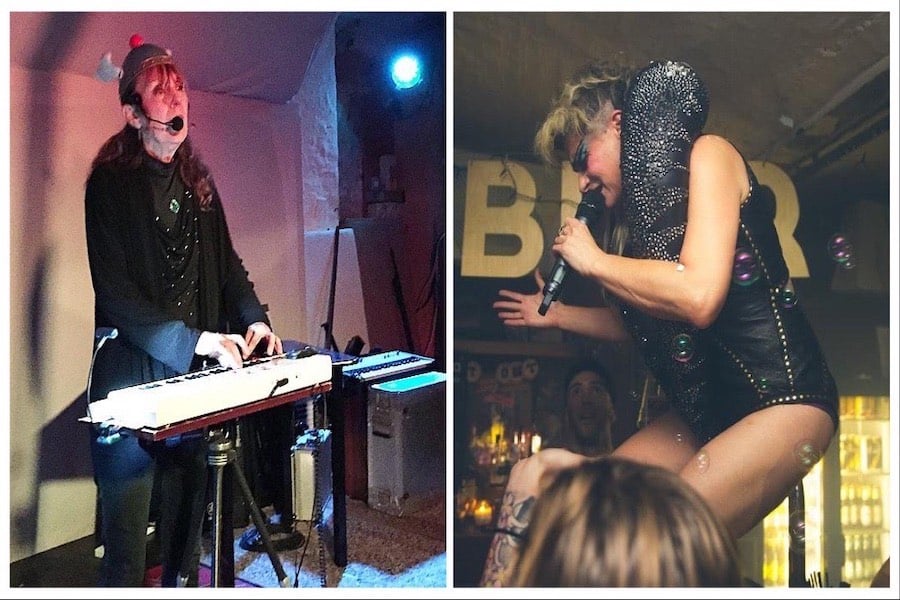
To further support artist education and development, the Islington Mill Foundation was established.
Bill continued: “Islington Mill as a whole is wanting to establish the last Friday of the month as an ‘Open Door Day’ where anything that people want to do and the public can come in and visit and we hope that over time a set of regular activities or events will take shape to establish that as a time in everyone diary that going to the mill, you will encounter something.
“Maybe this will spread out across the wider Chapel Street area. I already know that the Cathedral does something similar also on the last Friday.
We are kick-starting this as a celebration of the building works finishing, MQU, and also coincidentally my 50 birthday with an open studio and Makers Market on the 15th of July free and open to all.
As a charitable organisation, the foundation works tirelessly to bring art and people together, offering programs that encourage artistic growth and engagement.
Whether through workshops, residencies, or exhibitions, the foundation strives to bridge the gap between artists and the wider public, promoting dialogue, understanding, and appreciation for the arts.
Artists’ collaboration and partnership
The success of Islington Mill as a community project can be attributed to the remarkable collaborations and partnerships it has forged over the years.
Working hand-in-hand with Salford City Council, the mill has expanded its footprint to include the adjacent Regents Trading Estate, where new artist studios, event spaces, and a community garden have been established.
The recent acquisition and refurbishment of the New Islington Mill, in partnership with the Salford council, further reinforces the mill’s dedication to providing creative spaces for businesses and artists from diverse disciplines.
As the mill prepares to welcome visitors into its radically transformed buildings in 2023, the future looks bright.
Islington Mill will continue to evolve, shape, and be shaped by the talented individuals who call it home.
As the mill prepares to welcome visitors into its radically transformed buildings in 2023, the future looks bright.
Islington Mill will continue to evolve, shape, and be shaped by the talented individuals who call it home.
The public is encouraged to support Islington Mill and help secure its future by donating or getting involved in various ways.
You can check out their Patreon by clicking here
You can find out much more about the Islington Mill by clicking here and you can find out about the Partisan Collective by clicking here.
They have also produced a ZINE documenting the progress of the Mill over the years, which you can download by clicking here.
- This article was last updated 1 year ago.
- It was first published on 19 July 2023 and is subject to be updated from time to time. Please refresh or return to see the latest version.
Did we miss something? Let us know: press@ilovemanchester.com
Want to be the first to receive all the latest news stories, what’s on and events from the heart of Manchester? Sign up here.
Manchester is a successful city, but many people suffer. I Love Manchester helps raise awareness and funds to help improve the lives and prospects of people across Greater Manchester – and we can’t do it without your help. So please support us with what you can so we can continue to spread the love. Thank you in advance!
An email you’ll love. Subscribe to our newsletter to get the latest news stories delivered direct to your inbox.
Got a story worth sharing?
What’s the story? We are all ears when it comes to positive news and inspiring stories. You can send story ideas to press@ilovemanchester.com
While we can’t guarantee to publish everything, we will always consider any enquiry or idea that promotes:
- Independent new openings
- Human interest
- Not-for-profit organisations
- Community Interest Companies (CiCs) and projects
- Charities and charitable initiatives
- Affordability and offers saving people over 20%
For anything else, don’t hesitate to get in touch with us about advertorials (from £350+VAT) and advertising opportunities: advertise@ilovemanchester.com

Frankie Lipman steps into Lady Macbeth’s shoes in gutsy new take on Shakespeare

Zeus gets a Salford makeover in this electrifying new play celebrating young creatives


Best bars and pubs to watch the football and live sport in Manchester

Discotheque Royale vs Piccadilly 21s: which was your favourite 90s Manchester club?
